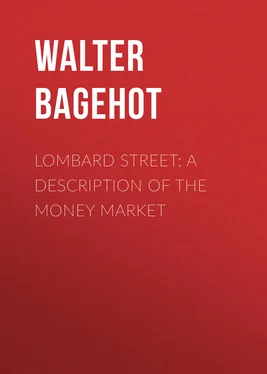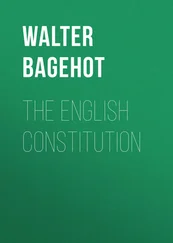Walter Bagehot - Lombard Street - A Description of the Money Market
Здесь есть возможность читать онлайн «Walter Bagehot - Lombard Street - A Description of the Money Market» — ознакомительный отрывок электронной книги совершенно бесплатно, а после прочтения отрывка купить полную версию. В некоторых случаях можно слушать аудио, скачать через торрент в формате fb2 и присутствует краткое содержание. Жанр: foreign_prose, История, foreign_edu, foreign_antique, на английском языке. Описание произведения, (предисловие) а так же отзывы посетителей доступны на портале библиотеки ЛибКат.
- Название:Lombard Street: A Description of the Money Market
- Автор:
- Жанр:
- Год:неизвестен
- ISBN:нет данных
- Рейтинг книги:4 / 5. Голосов: 1
-
Избранное:Добавить в избранное
- Отзывы:
-
Ваша оценка:
- 80
- 1
- 2
- 3
- 4
- 5
Lombard Street: A Description of the Money Market: краткое содержание, описание и аннотация
Предлагаем к чтению аннотацию, описание, краткое содержание или предисловие (зависит от того, что написал сам автор книги «Lombard Street: A Description of the Money Market»). Если вы не нашли необходимую информацию о книге — напишите в комментариях, мы постараемся отыскать её.
Lombard Street: A Description of the Money Market — читать онлайн ознакомительный отрывок
Ниже представлен текст книги, разбитый по страницам. Система сохранения места последней прочитанной страницы, позволяет с удобством читать онлайн бесплатно книгу «Lombard Street: A Description of the Money Market», без необходимости каждый раз заново искать на чём Вы остановились. Поставьте закладку, и сможете в любой момент перейти на страницу, на которой закончили чтение.
Интервал:
Закладка:
In 1847, the Banking Department was reduced to L 1,994,000 1857 " " L 1,462,000 1866 " " L 3,000,000
In fact, in none of those years could the Banking Department of the Bank of England have survived if the law had not been broken. Nor must it be fancied that this danger is unreal, artificial, and created by law. There is a risk of our thinking so, because we hear that the danger can be cured by breaking an Act; but substantially the same danger existed before the Act. In 1825, when only coin was a legal tender, and when there was only one department in the Bank, the Bank had reduced its reserve to 1,027,000 L., and was within an ace of stopping payment.
But the danger to the depositing banks is not the sole or the principal consequence of this mode of keeping the London reserve. The main effect is to cause the reserve to be much smaller in proportion to the liabilities than it would otherwise be. The reserve of the London bankers being on deposit in the Bank of England, the Bank always lends a principal part of it. Suppose, a favourable supposition, that the Banking Department holds more than two-fifths of its liabilities in cash—that it lends three-fifths of its deposits and retains in reserve only two-fifths. If then the aggregate of the bankers' deposited reserve be 5,000,000 L., 3,000,000 L. of it will be lent by the Banking Department, and 2,000,000 L. will be kept in the till. In consequence, that 2,000,000 L. is all which is really held in actual cash as against the liabilities of the depositing banks. If Lombard Street were on a sudden thrown into liquidation, and made to pay as much as it could on the spot, that 2,000,000 L. would be all which the Bank of England could pay to the depositing banks, and consequently all, besides the small cash in the till, which those banks could on a sudden pay to the persons who have deposited with them.
We see then that the banking reserve of the Bank of England—some 10,000,000 L. on an average of years now, and formerly much less—is all which is held against the liabilities of Lombard Street; and if that were all, we might well be amazed at the immense development of our credit system—in plain English, at the immense amount of our debts payable on demand, and the smallness of the sum of actual money which we keep to pay them if demanded. But there is more to come. Lombard Street is not only a place requiring to keep a reserve, it is itself a place where reserves are kept. All country bankers keep their reserve in London. They only retain in each country town the minimum of cash necessary to the transaction of the current business of that country town. Long experience has told them to a nicety how much this is, and they do not waste capital and lose profit by keeping more idle. They send the money to London, invest a part of it in securities, and keep the rest with the London bankers and the bill brokers. The habit of Scotch and Irish bankers is much the same. All their spare money is in London, and is invested as all other London money now is; and, therefore, the reserve in the Banking Department of the Bank of England is the banking reserve not only of the Bank of England, but of all London—and not only of all London, but of all England, Ireland, and Scotland too.
Of late there has been a still further increase in our liabilities. Since the Franco-German war, we may be said to keep the European reserve also. Deposit Banking is indeed so small on the Continent, that no large reserve need be held on account of it. A reserve of the same sort which is needed in England and Scotland is not needed abroad. But all great communities have at times to pay large sums in cash, and of that cash a great store must be kept somewhere. Formerly there were two such stores in Europe, one was the Bank of France, and the other the Bank of England. But since the suspension of specie payments by the Bank of France, its use as a reservoir of specie is at an end. No one can draw a cheque on it and be sure of getting gold or silver for that cheque. Accordingly the whole liability for such international payments in cash is thrown on the Bank of England. No doubt foreigners cannot take from us our own money; they must send here 'value in some shape or other for all they take away. But they need not send 'cash;' they may send good bills and discount them in Lombard Street and take away any part of the produce, or all the produce, in bullion. It is only putting the same point in other words to say that all exchange operations are centering more and more in London. Formerly for many purposes Paris was a European settling-house, but now it has ceased to be so. The note of the Bank of France has not indeed been depreciated enough to disorder ordinary transactions. But any depreciation, however small—even the liability to depreciation without its reality—is enough to disorder exchange transactions. They are calculated to such an extremity of fineness that the change of a decimal may be fatal, and may turn a profit into a loss. Accordingly London has become the sole great settling-house of exchange transactions in Europe, instead of being formerly one of two. And this pre-eminence London will probably maintain, for it is a natural pre-eminence. The number of mercantile bills drawn upon London incalculably surpasses those drawn on any other European city; London is the place which receives more than any other place, and pays more than any other place, and therefore it is the natural 'clearing house.' The pre-eminence of Paris partly arose from a distribution of political power, which is already disturbed; but that of London depends on the regular course of commerce, which is singularly stable and hard to change.
Now that London is the clearing-house to foreign countries, London has a new liability to foreign countries. At whatever place many people have to make payments, at that place those people must keep money. A large deposit of foreign money in London is now necessary for the business of the world. During the immense payments from France to Germany, the sum in transitu —the sum in London has perhaps been unusually large. But it will ordinarily be very great. The present political circumstances no doubt will soon change. We shall soon hold in Lombard Street far less of the money of foreign governments; but we shall hold more and more of the money of private persons; for the deposit at a clearing-house necessary to settle the balance of commerce must tend to increase as that commerce itself increases.
And this foreign deposit is evidently of a delicate and peculiar nature. It depends on the good opinion of foreigners, and that opinion may diminish or may change into a bad opinion. After the panic of 1866, especially after the suspension of Peel's Act (which many foreigners confound with a suspension of cash payments), a large amount of foreign money was withdrawn from London. And we may reasonably presume that in proportion as we augment the deposits of cash by foreigners in London, we augment both the chances and the disasters of a 'run' upon England.
And if that run should happen, the bullion to meet it must be taken from the Bank. There is no other large store in the country. The great exchange dealers may have a little for their own purposes, but they have no store worth mentioning in comparison with this. If a foreign creditor is so kind as to wait his time and buy the bullion as it comes into the country, he may be paid without troubling the Bank or distressing the money market. The German Government has recently been so kind; it was in no respect afraid. But a creditor who takes fright will not wait, and if he wants bullion in a hurry he must come to the Bank of England.
In consequence all our credit system depends on the Bank of England for its security. On the wisdom of the directors of that one Joint Stock Company, it depends whether England shall be solvent or insolvent. This may seem too strong, but it is not. All banks depend on the Bank of England, and all merchants depend on some banker. If a merchant have 10,000 L. at his bankers, and wants to pay it to some one in Germany, he will not be able to pay it unless his banker can pay him, and the banker will not be able to pay if the Bank of England should be in difficulties and cannot produce his 'reserve.'
Читать дальшеИнтервал:
Закладка:
Похожие книги на «Lombard Street: A Description of the Money Market»
Представляем Вашему вниманию похожие книги на «Lombard Street: A Description of the Money Market» списком для выбора. Мы отобрали схожую по названию и смыслу литературу в надежде предоставить читателям больше вариантов отыскать новые, интересные, ещё непрочитанные произведения.
Обсуждение, отзывы о книге «Lombard Street: A Description of the Money Market» и просто собственные мнения читателей. Оставьте ваши комментарии, напишите, что Вы думаете о произведении, его смысле или главных героях. Укажите что конкретно понравилось, а что нет, и почему Вы так считаете.












